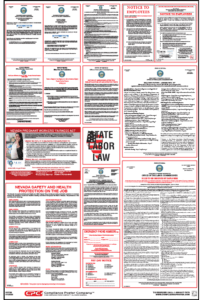
If you read the first part of our Nevada blog yesterday about recent state laws giving employees greater benefits and freedoms in their work lives, then you already know a little bit about the changes to three of the Nevada mandatory workplace postings. If you haven’t read yesterday’s blog, check it out so that you don’t miss out on all the Nevada news.
In this post, we cover three additional Nevada workplace postings that have changes brought about by new laws. These posting are:
- Notice Employee is Sick or Injured
- Paid Leave
- Safety and Health Protection on the Job
Notice Employee is Sick or Injured
The Notice Employee is Sick or Injured is a new state posting that provides employers and employees with notice of Assembly Bill 181 giving employees taking a sick day off latitude to call in sick from home. The posting explains that an employer can require an employee to provide notice when they cannot work because of an illness or a non-work-related injury. However, an employer cannot require the employee to be physically present in the workplace to provide the notice. An employer who violates this law is subject to an administrative penalty of up to $5,000. The law was effective on May 15, 2019.
Paid Leave
On January 1, 2020, Senate Bill 312 will go into effect requiring certain employers to provide their employees with paid time off to use for any reason. The law applies to Nevada employers with 50 or more employees and covered employers are required to post the Paid Leave notice in the workplace. The Paid Leave notice describes how paid leave is earned, used and paid. It also explains an employer’s responsibilities and the law’s exclusions.
Ten takeaways from the Paid Leave notice are that:
- An employee will accrue 0.01923 hours of paid leave per hour worked;
- An employee can accrue up to 40 hours of paid leave per year;
- An employee must be paid his or her regular rate of pay while on paid leave, payable on the day wages are normally paid;
- An employee may use paid leave without having to provide a reason for the leave;
- An employee must give his or her employer notice of taking leave as soon as practicable;
- An employer may have a policy that requires employees to use the leave in minimum increments not to exceed four hours;
- An employer may not deny leave or retaliate against an employee for using accrued paid leave in the manner provided by law;
- An employer must maintain a record of paid leave accrual and use for a period of one year;
- The law exempts employers in their first two years of operation; and
- The law excludes (1) employees covered by a collective bargaining agreement providing leave accrued at the same rate as Paid Leave and (2) temporary, seasonal or on-call employees.
An employer who violates the law is subject to an administrative penalty of up to $5,000.
Safety and Health Protection on the Job
The Nevada Occupational Safety and Health Act (Nevada OSHA) was amended Senate Bill 40, a relatively brief measure with significant consequences. The amendment simply provides that the civil penalties which may be imposed for Nevada OSHA violations may not be greater than the penalties for the corresponding violations of the Federal OSH Act. The amendment, in effect, gives the Nevada Division of Industrial Relations (DIR) the authority to increase Nevada OSHA penalties to federal penalty levels. As a result, Nevada employers will see a 78% increase in the state’s civil penalty maximums this year.
The new civil penalty maximums, based on the severity of the violation, are:
- Serious and nonserious violations: $13,260.00 per violation
- Failure to post and maintain required notices and records: $13,260.00 per violation
- Failure to Correct violations: $13,260.00 per day
- Willful or Repeated violations: $132,598.00 per violation
The amendment also extends the time within which an employer must notify the DIR of its intention to contest a citation or a proposed penalty assessment from 15 days to 30 days.
The Nevada OSHA penalty increases went into effect on October 1, 2019, but they could increase again as early as January of next year. That’s because Senate Bill 40 permits Nevada OSHA penalties to increase each year by the same amount that federal penalties increase each year to account for inflation. Federal penalty adjustments are announced every January 15, so we’ll be watching for an announcement from the Nevada DIR about that time.
Conclusion
Nevada has had a busy year when it comes to major posting changes. Nearly every posting change we’ve covered requires immediate posting. Purchase the Nevada All-On-One™ Labor Law Poster and take the hassle out of your compliance responsibilities.
|
|

